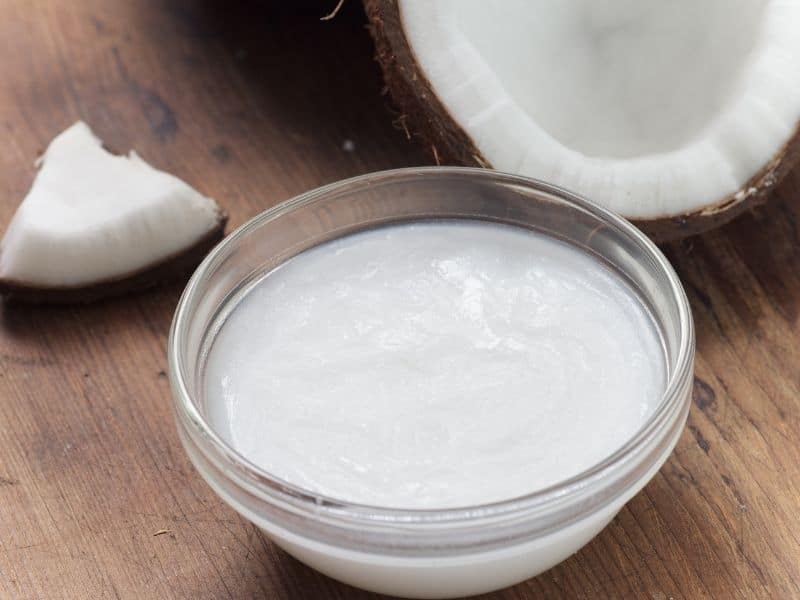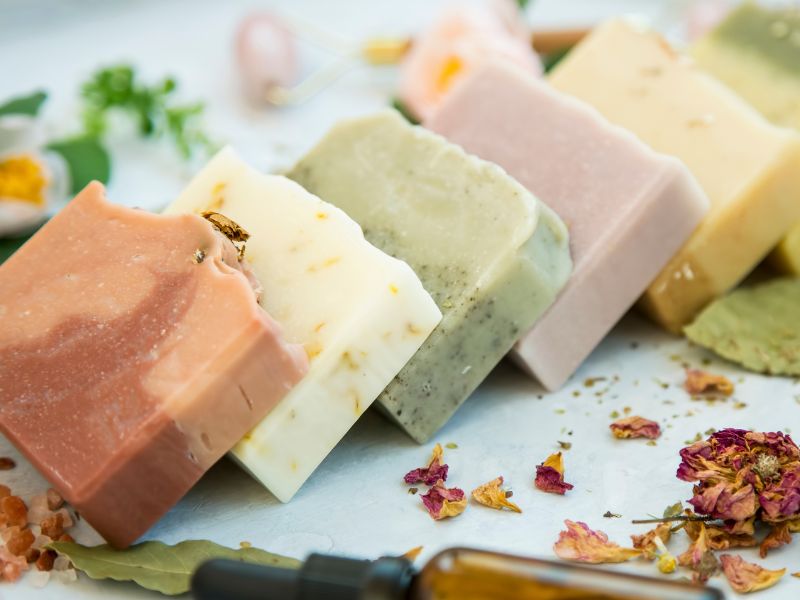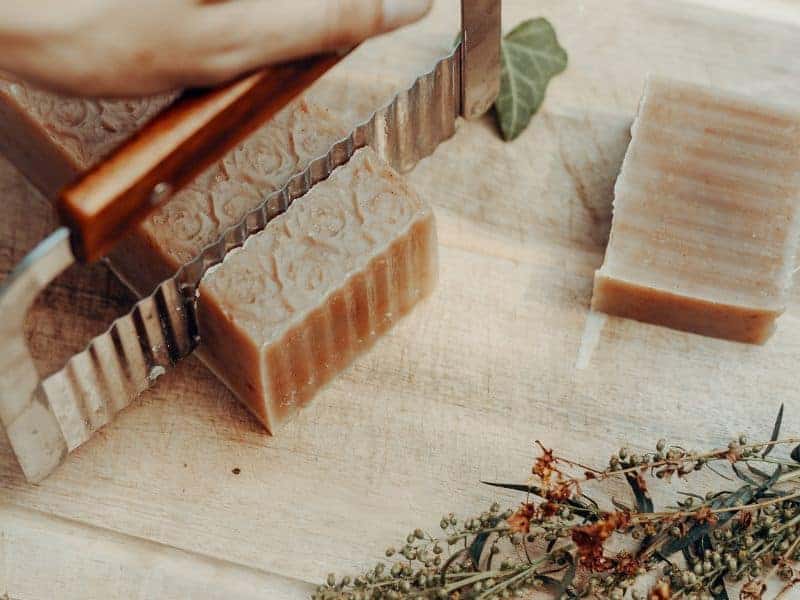A variety of oils exist that can be used for making soap, however, coconut oil is one of the most popular types of oil used in soap making. The problem is that multiple types of coconut oil exist. So, what coconut oil is best for soap making?
Refined coconut oil with a 76 F melting point is the best coconut oil for soap making. While you may be tempted to use more expensive coconut oil, it is not sustainable if you want to try and run a soap-making business. However, it may be fine for small batches of soap for home use.
Refined coconut oil is coconut oil that has been treated to remove impurities. This coconut oil is also more stable, meaning it is less likely to go rancid than virgin coconut oil.
Let’s take a closer look at the uses and benefits of coconut oil in soap making.
Types of Coconut Oil For Soap Making
Virgin Coconut Oil
This coconut oil is extracted from fresh coconut meat without the use of heat or chemicals. It is the least processed form of coconut oil and has a coconut flavor and aroma.
Refined Coconut Oil
Refined coconut oil is extracted from coconut meat that has been dried (copra). The copra is then treated with solvents and exposed to high temperatures. This type of coconut oil does not have a coconut flavor or aroma.
Fractionated Coconut Oil
Fractionated coconut oil has had some of the long-chain triglycerides removed. This coconut oil is liquid at room temperature and has a neutral coconut scent.
76 Degree Coconut Oil
This coconut oil is coconut oil that has a lower melting point. It can be melted at 76 degrees Fahrenheit. It is solid at room temperature but will melt when touched.
This is one of the most used for soap making because it makes a nice soft soap that produces a good lather.
92 Degree Coconut Oil
This coconut oil is coconut oil that has a higher melting point. It can be melted at 92 degrees Fahrenheit. It is solid at room temperature but will also melt when touched.
This one is not used quite as often for soap making because it makes hard bars of soap that do not lather very well.
Refined vs Unrefined Coconut Oil
The coconut oil you use for soap making will depend on what you are trying to achieve with your soap.
Refined
If you want a coconut-scented soap, then you will need to use virgin coconut oil. However, even with the more expensive coconut oil, the coconut fragrance may not even be noticeable once the saponification process is complete.
You may still have to add fragrance oil to make sure the smell of coconut is noticeable in the final product.
Unrefined
if you do not want a coconut scent in your soap, then refined coconut oil is the best option. However, you can still buy a coconut fragrance oil so give your soap a coconut fragrance.
It is important to remember that oils are not often chosen because of the potential fragrance they may add, they are chosen for the characteristics they bring to the soap.
Characteristics of Coconut Oil Soap
Now that we have gone over the types of coconut oil, let’s take a look at the characteristics of coconut oil soap.
Coconut oil soap is known for its bubbly lather. The lather is creamy and moisturizing, making it perfect for those with dry skin.
Coconut oil soap is also known for its ability to cleanse the skin without stripping it of its natural oils. This makes it an excellent choice for those with sensitive skin.
Coconut oil soap is also known for its long-lasting properties. Because coconut oil is a hard oil, it helps to make the soap last longer.
Coc coconut oil soap is also less likely to melt in high temperatures. This makes it a good choice for those who live in hot climates.
Coconut oil soap is a versatile soap that can be used for a variety of purposes. Whether you want a coconut-scented soap or a soap that is long-lasting and moisturizing, coconut oil soap is a great option.
Pros and Cons of Using Coconut Oil For Soap Making
Now that we have looked at the types of coconut oil and the characteristics of coconut oil soap, let’s take a look at the pros and cons of using coconut oil for soap making.
Pros:
- Bubbly lather.
- Ability to cleanse the skin without stripping it of its natural oils.
- Long-lasting properties.
- Less likely to melt in high temperatures.
Cons:
- Coconut oil can be expensive.
- You may need to use more coconut oil than other oils to get the same results.
- The coconut scent may not be noticeable once the saponification process is complete.
- Coconut oil soap can be drying if used too frequently.
Overall, coconut oil is a great choice for soap making. It produces a bubbly lather that is perfect for those with dry skin. coconut oil soap is also known for its long-lasting properties and its ability to cleanse the skin without stripping it of its natural oils. However, coconut oil can be expensive and you may need to use more coconut oil than other oils to get the desired results.
Surprising Benefits of Using Coconut Oil For Soap Making
Coconut oil has many benefits that make it an excellent choice for soap making. It is a natural, coconutty-smelling oil that is packed with nutrients and antioxidants that are beneficial for the skin. Coconut oil is also relatively inexpensive, making it a great option for those on a budget.
When it comes to soap making, coconut oil provides a number of benefits. It creates a fluffy, creamy lather that is perfect for cleansing the skin. Coconut oil is also known for its ability to lock in moisture, making it an excellent choice for dry or sensitive skin. Additionally, coconut oil soap is said to be helpful in treating a number of skin conditions, such as psoriasis, eczema, and acne.
Where to Buy Coconut Oil For Soap Making
Now that you know all about the benefits of coconut oil for soap making, you may be wondering where you can buy coconut oil. Coconut oil can be found at most grocery stores and health food stores. You can also purchase coconut oil online.
When purchasing coconut oil, it is important to make sure that you are buying a high-quality product.
I would prefer to get my supplies from reputable wholesale suppliers over taking chances on a place like amazon or ebay.
How to Store Coconut Oil For Soap Making
Once you have purchased coconut oil, it is important to store it properly. coconut oil should be stored in a cool, dark place.
Coconut oil can also be stored in the refrigerator or freezer.
If coconut oil becomes solid, it can be melted by placing the container of coconut oil in a bowl of hot water.
How to Use Coconut Oil For Soap Making
Now that you know all about coconut oil and where to buy it, let’s take a look at how to use coconut oil for soap making.
When using coconut oil for soap making, it is important to remember that coconut oil will harden at room temperature.
For this reason, coconut oil should be melted before adding it to soap recipes.
Coconut oil can be melted by placing the container of coconut oil in a bowl of hot water.
Once the coconut oil has melted, it can be added to soap recipes as desired.
Does Coconut Oil Expire?
Coconut oil does not technically expire, but it can go bad.
If coconut oil has gone bad, it will have a rancid smell and will no longer be good for use.
Coconut oil that has gone bad should be discarded.
How to Tell if Coconut Oil has Gone Bad
There are a few telltale signs that coconut oil has gone bad.
If coconut oil has gone bad, it will have a rancid smell.
Additionally, coconut oil that has gone bad will no longer be good for use.
If you suspect that coconut oil has gone bad, it should be discarded.
Frequently Asked Questions
Yes, coconut oil is an excellent choice for soap making. It produces a bubbly lather that is perfect for those with dry skin. coconut oil soap is also known for its long-lasting properties and its ability to cleanse the skin without stripping it of its natural oils. However, coconut oil can be expensive and you may need to use more coconut oil than other oils to get the desired results.
Coconut oil has many benefits that make it an excellent choice for soap making. It is a natural, coconutty-smelling oil that is packed with nutrients and antioxidants that are beneficial for the skin. coconut oil is also known for its ability to create a rich, creamy lather and to lock in moisture, making it an excellent choice for those with dry or sensitive skin.
Coconut oil can be found at most grocery stores and health food stores. You can also purchase coconut oil online. When purchasing coconut oil, it is important to make sure that you are buying a high-quality product.
Coconut oil should be stored in a cool, dark place. If coconut oil becomes solid, it can be melted by placing the container of coconut oil in a bowl of hot water.
Coconut oil has many benefits that make it an excellent choice for soap making. It is a natural, coconutty-smelling oil that is packed with nutrients and antioxidants that are beneficial for the skin. coconut oil is also known for its ability to create a rich, creamy lather and to lock in moisture, making it an excellent choice for those with dry or sensitive skin.
Conclusion
In conclusion, refined coconut oil with a 76 F melting point is as good as it gets for soap making unless you just want something unrefined simply to have it and say it’s unrefined. However, from a financial standpoint that will not be sustainable.
It is also important to make sure you choose a quality supplier that sources an ethical product.
Once you have done all of that then you are ready to start making your own homemade coconut oil soap! Good luck!






